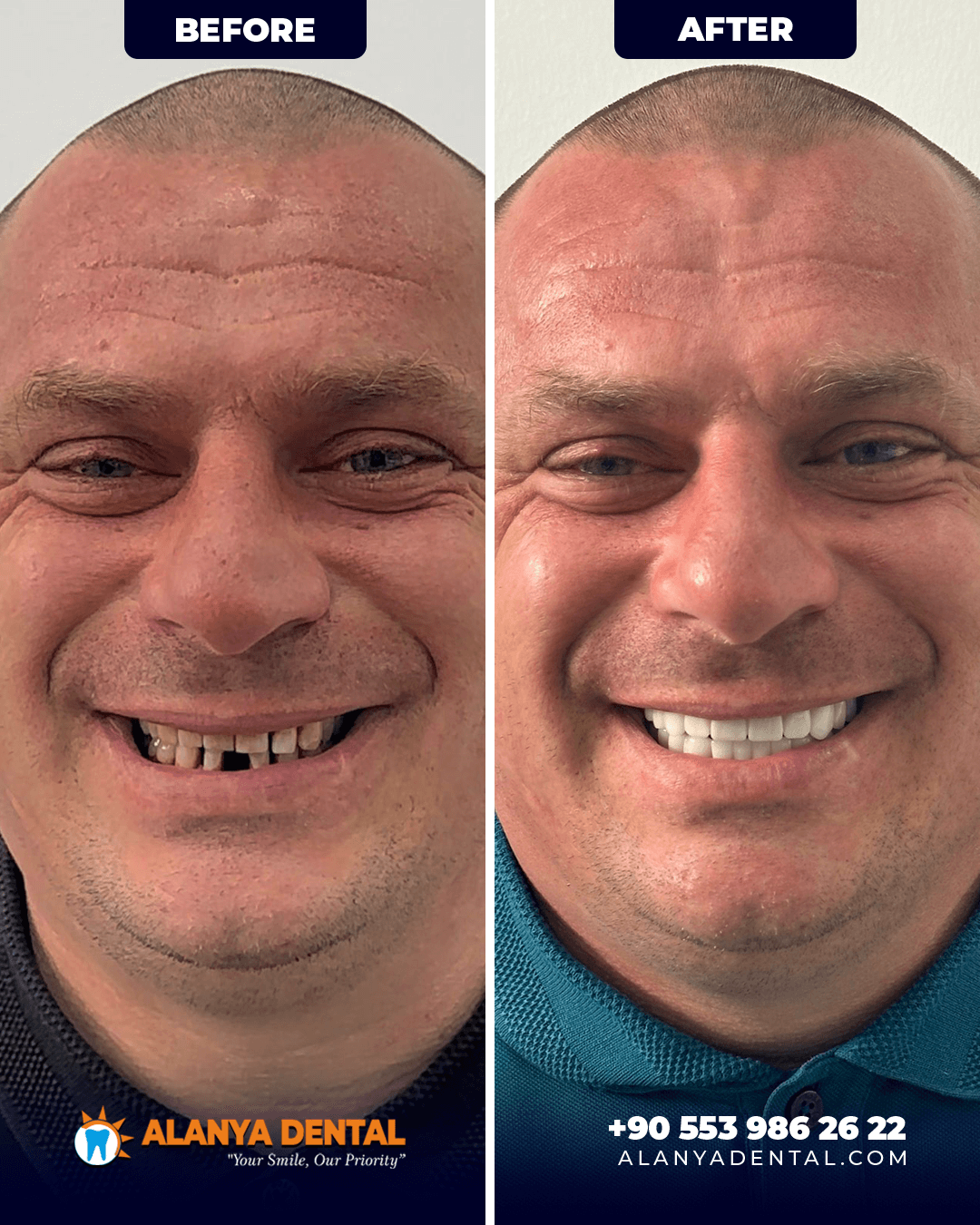Root Canal Treatment in Turkey

Root Canal Treatment in Turkey
Root canal treatment has been a safe and effective treatment for many years. When the nerve tissue in a tooth becomes inflamed due to decay, trauma, or other causes, this treatment can preserve the tooth instead of extracting it. The process involves cleaning the tooth, removing the infected tissue, and then filling it with a special filling material. When performed correctly, it preserves both the tooth's structure and chewing function for many years.
Modern anesthesia techniques are used during treatment to ensure patient comfort. The procedure time varies depending on the condition of the tooth. In some cases, it can be completed in a single session, while severely infected teeth may require multiple sessions. The lifespan of a tooth after treatment is directly proportional to the patient's meticulous oral hygiene.


What Are the Symptoms of Root Canal Treatment?
Some discomfort felt in the mouth may be a sign of a dental problem requiring root canal treatment. Ignoring these symptoms increases the risk of tooth loss. Here are the symptoms of root canal treatment:
- Severe and persistent toothache
- Prolonged sensitivity to hot or cold foods and drinks
- Darkening or darkening of the tooth color
- Pain or a feeling of pressure when chewing
- Swelling, abscess, or discharge from the gums
These signs usually indicate that the nerve tissue inside the tooth is inflamed or dead. Severe toothache often worsens at night and makes it difficult to sleep. Persistent sensitivity to hot or cold is the most common sign of nerve damage. Discoloration occurs as a result of impaired blood circulation to the tooth.
How is Root Canal Treatment Performed?
Before treatment, the dentist evaluates the condition of the tooth with a detailed examination and x-rays. Local anesthesia is administered before the procedure to ensure the patient feels no pain. A small incision is made at the top of the tooth to access the pulp chamber. Damaged or infected pulp tissue is carefully removed with specialized instruments. The root canal is then irrigated and shaped with various solutions to eliminate bacteria. Alanya Dental Clinic utilizes modern equipment and experienced dentists to perform this process, aiming to restore healthy teeth to its patients.

Root Canal Treatment Procedures
The treatment process begins with a detailed examination. The dentist takes X-rays to assess the condition of the tooth. These images reveal the structure and number of root canals and the potential spread of infection. Local anesthesia prevents the patient from experiencing pain during the procedure. Decayed tissue is removed, and the tooth's nerve chamber is accessed. The root canals are meticulously cleaned using fine, specialized instruments.
In this stage, infected tissue is removed, and the canals are shaped according to specific standards. After disinfection, the spaces are filled with a biocompatible filling material. The filling ensures complete closure of the canal, preventing bacterial re-entry. The upper portion of the tooth is covered with a temporary filling or a permanent restoration is applied.
What is Included in Root Canal Treatment?
Root canal treatment doesn't just involve removing the nerve from a tooth. It involves implementing a comprehensive treatment plan to save the tooth. It encompasses many stages, from the initial examination to the final checkup. The steps involved include diagnosis, local anesthesia, decay removal, root canal opening, removal of infected tissue, disinfection of the root canal, sealing with a biocompatible filling material, and the placement of the tooth's upper restoration. Each stage is performed under sterile conditions.


What Are the Advantages of Root Canal Treatment?
Root canal treatment protects long-term oral health by saving teeth from extraction. When performed correctly, it offers significant benefits to patients in terms of aesthetics, function, and comfort. Here are the advantages of root canal treatment.
- Preservation of natural teeth in the mouth
- Prevention of infection spread
- Preservation of chewing function
- Maintenance of visual integrity
- Improvement of overall oral health
Keeping natural teeth in the mouth postpones the need for artificial solutions like implants or dentures. Preventing the spread of infection prevents damage to neighboring teeth and the jawbone. Preserving chewing function improves nutritional quality.
Root Canal Treatment Prices in Turkey
The cost of root canal treatment varies for each patient. The primary factors determining the price are the location of the tooth, the number of root canals, the level of infection, and the need for additional restoration. A higher number of canals in the back teeth increases the length and complexity of the procedure. This is reflected in the cost. Alanya Dental Clinic offers root canal treatment services to its patients using modern equipment, a hygienic environment, and personalized treatment plans.

What Complaints Require Root Canal Treatment?
One of the most common problems when it comes to dental health is deep decay or trauma reaching the nerve. The pulp, located within the tooth, houses the nerve and vascular tissue. When this area becomes inflamed or infected, severe pain, tenderness, and even swelling can occur. Symptoms such as throbbing pain that worsens at night, sudden pain in the tooth while eating, and prolonged discomfort with hot or cold temperatures may be signs of root canal treatment.
A tooth that has been impacted, broken, or cracked also requires root canal treatment. Trauma can cause discoloration when nerve tissue is damaged. While this discoloration is often not accompanied by pain, it indicates that the tooth is losing vitality. Early diagnosis directly impacts the success of root canal treatment. Regular dental checkups can help identify problems before they become serious.


What is Root Canal Treatment?
Inside the tooth is a soft tissue called the pulp. This tissue consists of nerves, blood vessels, and connective tissue. The pulp is the primary structure that provides nutrition and sensitivity to the tooth. Deep decay, cracks, trauma, or advanced gum disease can cause the pulp to become inflamed or die. Root canal treatment is the process of removing this damaged tissue, cleaning and shaping the root canal space, and filling it with biocompatible materials.
Treatment requires microscopic precision. Therefore, dentists utilize specialized instruments and modern technologies during the procedure. The goal of root canal treatment is to save the tooth from extraction and ensure long-term oral health. After the procedure, a crown can be applied to the tooth, if necessary, to increase its durability. Before the procedure, x-rays are taken to determine the root structure and extent of the infection.
FAQ's
Frequently Asked Questions
Root canal treatment is a procedure that aims to extend the lifespan of a natural tooth. When performed with the correct technique and followed by a suitable restoration, a root canal-treated tooth can function flawlessly for many years. Oral hygiene, chewing force balance, and regular checkups are among the most important factors determining a tooth's lifespan.
After treatment, the upper part of the tooth becomes vulnerable to fractures. Therefore, it must be reinforced with a suitable crown or filling. Otherwise, cracks can develop over time, leading to tooth extraction. To extend the life of root canal-treated teeth, it's recommended not to break hard foods directly on them.
During the first appointment, the infected tissue is usually cleaned, the canal is shaped, and a temporary filling is placed. In some cases, medication is placed in the canal to allow the infection to completely clear. This phase can take several days. Once the infection is completely removed, the canals are sealed with special filling materials, and the tooth is restored.
Today, thanks to advanced equipment and imaging techniques, many root canal treatments can be completed in a single visit. However, for teeth with extensive infection at the root apex, dentists can spread the treatment over time, ensuring a safer recovery. The modern root canal treatment methods used at Alanya Dental Clinic make the process more comfortable for patients.
It's important to avoid consuming hard foods, especially the first day after treatment. A tooth that has undergone root canal treatment will be more vulnerable until the restoration is completed. If there's a temporary filling, avoid biting too hard to avoid the risk of it falling out. Oral care routines should be maintained even after treatment. Regular brushing and flossing protect both the treated tooth and the surrounding tissues.
Conditions such as persistent severe pain, excessive swelling, or a feeling of tooth mobility after treatment should be reported to your dentist immediately. These symptoms may require additional intervention during the treatment process. General health also plays a role in the healing process. Adequate sleep, a balanced diet, and habits that support the immune system contribute to the long-term success of root canal treatment.

Book Your Free Consultation Today!
Free Consultation

Healthy Teeth, Happy Smile!
Healthy teeth are the foundation of a confident and radiant smile — because when your teeth are healthy, every smile shines brighter and makes you feel happier inside and out.
Why Booking a Dental Appointment at Alanya Dental Clinic is Essential for Your Oral Health


 TR
TR DE
DE Teeth Cleaning
Teeth Cleaning 
















